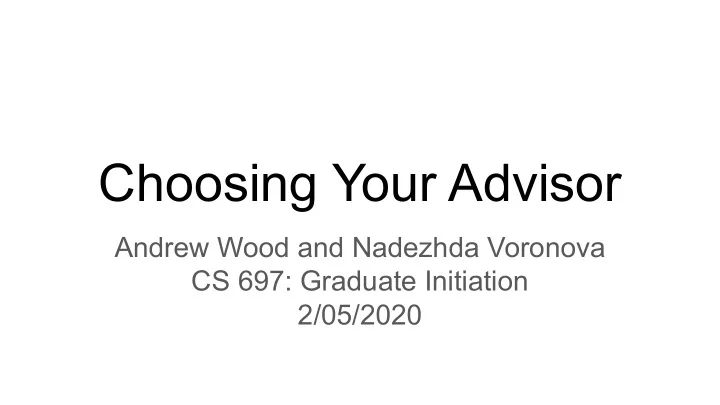

Choosing Your Advisor Andrew Wood and Nadezhda Voronova CS 697: Graduate Initiation 2/05/2020
So you want a PhD Lifecycle of a PhD student: 1) Find a research topic you are interested in 2) Pass your qualifiers: “worthy” of your admittance to the program 3) Form a committee 4) Pass your candidacy exam: outline of dissertation 5) Defend dissertation: earn your PhD 6) Graduate! -Cannot to this alone: -Find (a) mentor(s) among faculty, they will help you!
Role of the Advisor (P.I.) -Advisor(s) are role models -Share common interests -Develop your research skills -Write letters of recommendation, help you network -Guide you through grad school -Teach you the “ins-and-outs” of your field -Funding!
Presentation Overview When finding an advisor: two pipeline must occur in parallel Search for advisor Weighing internal Asking questions preferences Make decision happy unhappy
Mental: Choosing An Advisor -They’re people too. -Imagine you got to choose your parent, what would you look for? -How involved in your research your advisor should be?
Mental: Choosing An Advisor -Your advisor does not need to do exactly what you want to do. -You are not “pigeonholed” into doing what your advisor does once you graduate. -Caveat: Pigeonholed into the field, but not the specific topic. -You can have multiple advisors (if you choose)!
Physical: “Interviewing” Advisors -Are they clear about their expectations? -Supervision Style -Personality. Ask them questions about themselves!
Physical: Talk to current Grad Students -Current grad students have experience with their advisor(s) -Can provide extra insight. Worst case: an extra opinion -Bonus: interacting with your future labmates!
Making a Decision -Highly personal decision -Typically comes down to “style alignment” vs “research interest alignment” style alignment research alignment -Which one will you go with?
An Ideal Relationship -Both you and your advisor(s) communicate appropriately -You are satisfied with your research -Your advisor is happy with your progress -You have a plan for your PhD (IMPORTANT)
Maintaining Your Relationship -Communication is KEY -Keep your advisor in the loop! -Learn each other’s styles, build trust -Meetings at least twice a month (rule of thumb) -Keep records of your meetings
So you aren’t happy with your decision -Again, communication is key -Your advisor wants the best for you, they can help! -What are you unhappy with? -Research topic? -Job prospects? -Personal reasons? -Worst comes to worst: you can leave
Things to remember -This is just a job -Chances are, you and your advisor want the same things and will react similarly. - Put yourself in their shoes. If you were the advisor and someone was not happy, how would you react?
My Experiences: Andrew Bachelor program Master program PhD program + Research area + Relationship in general + Relationship in general + Relationship in general + Recommendations + Open communication + Recommendations + Open communication + Research Area - Open communication + Mentorship - Mentorship - Mentorship - Research are
My Experiences: Nadya Bachelor program Master program PhD program + Mentorship + Relationship in general + Relationship in general + Research area + Recommendations + Recommendations - Relationship in general + Open communication + Open communication - Recommendations + Research area + Mentorship - Open communication - Mentorship ? Research area
Recommend
More recommend